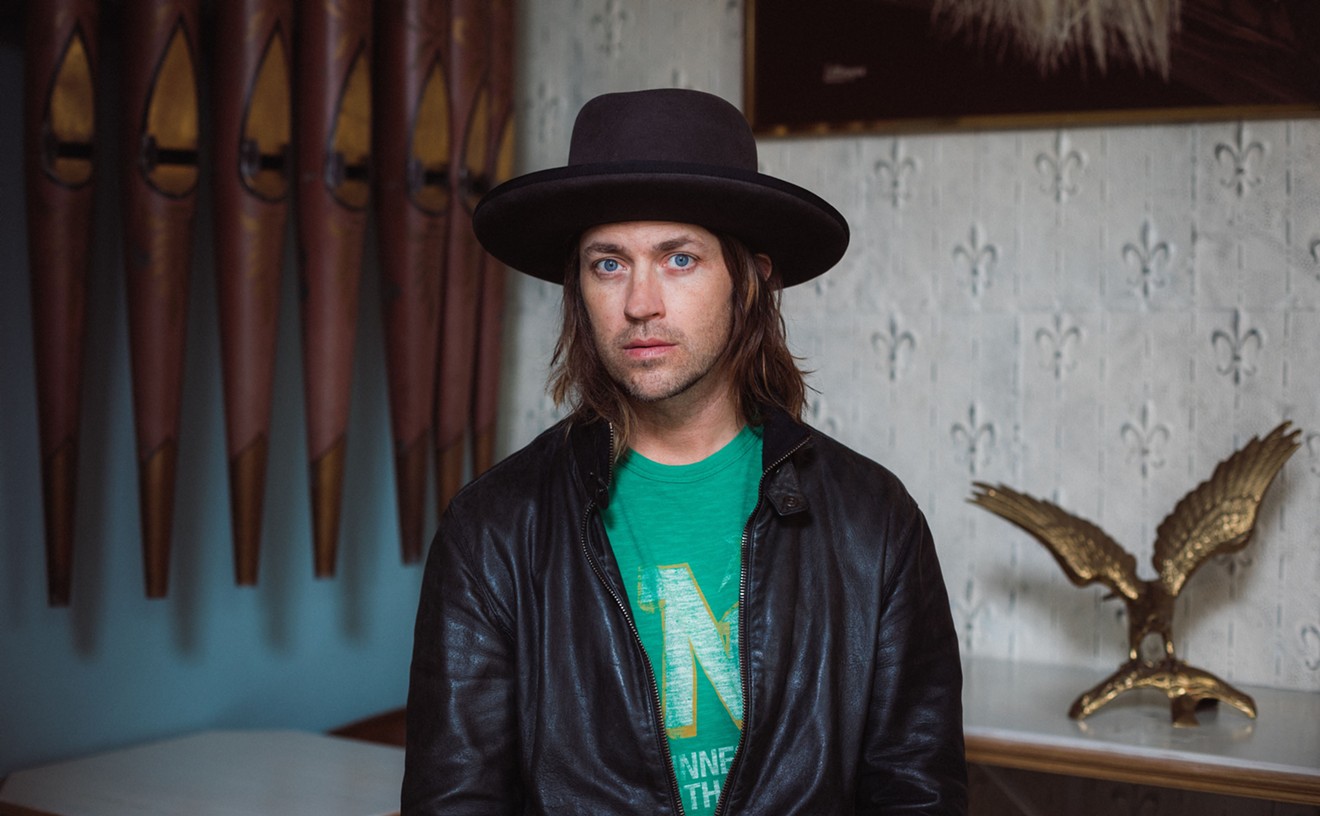As of April 11, there are 50 Miles Davis releases available from Columbia Records, a handful of which are multi-disc boxed sets celebrating his work with Gil Evans (including an entire disc of outtakes), the nights he played San Francisco's Plugged Nickel in 1965, and the sides he cut with his quintet (Wayne Shorter, Herbie Hancock, Tony Williams, and Ron Carter) from 1965 to 1968. And there's the entirety of Bitches Brew available for those with the patience and tolerance to sift through the dust to find the rare ounce of gold. That album alone both cemented Davis' importance to jazz and managed to defile his legacy; it paved the way to "Time After Time." You know no one who has listened to it all the way through, and anyone who insists the contrary is a liar, a saint, or a stoic.
That Columbia is releasing an entire box dedicated to the music Miles made with John Coltrane is simply inevitable; both men have been packaged and repackaged more often than Radio Shack stereo cables. (Next up: Columbia will release The Miles Davis Anthologies Anthology, a best of the best-ofs. Or not.) Their works together and apart have been rereleased, remastered, restored, and refined to the point where audiences can no longer discern the quality from the crap. For beginners, Columbia offers such warmed-over product as Love Songs and Acoustic; for advanced students, there are tin tombstones (the label has sense enough to do the packaging proud) such as the brand-"new" Miles Davis & John Coltrane: The Complete Columbia Recordings 1955-1961, replete with outtakes, alternate takes, false starts, and even snippets of studio dialogue (most of which sound like nothing but nonsense, half-thoughts presented as though they're somehow revelatory). It would take months just to decipher this one collection: It clocks in at more than six hours and contains multiple versions of single songs (disc two features four takes, back to back, of "Sweet Sue, Just You" -- and just try to tell the difference).
To disparage such an offering is akin to pushing aside a table full of gourmet offerings; there is no such thing as gorging yourself on a good thing. But like all jazz boxed sets that wallow in the minutiae (say, Coltrane's Prestige box, which contains more outtakes than final takes), The Complete Columbia Recordings goes almost too far in deconstructing the legend. It's a far better thing to sit down with Kind of Blue -- otherwise known as the Led Zeppelin IV of jazz albums, a disc without which no record collection is complete -- than to listen to its handful of standards spread out, interrupted, broken up, and broken down. There are few thrills more visceral in this world than hearing "So What" kick off Kind of Blue; it's the most comforting and chilling piece of music Davis ever put on tape, a murmur that becomes a heart attack. And there are few pleasures more tangible than winding down with "All Blues" and "Flamenco Sketches." Kind of Blue will always remain among the handful of perfect albums ever made; then, how does one improve upon a sunrise?
But disc four of this box interrupts the flow, presenting the modal masterpiece Kind of Blue as a work-in-progress. Since the boxed set is arranged in chronological order (beginning with October 26, 1955, sessions for 'Round About Midnight and ending with 1961 recordings for Someday My Prince Will Come), it doesn't worry about such cumbersome things as structure, mood, and sensation. So instead, we get "Love for Sale," followed by a false-started "Freddie Freeloader" and, then, the real thing, succeeded by, in order, "So What," "Blue in Green," an alternate take of "Flamenco Sketches," some grumbled studio chatter from Miles himself, then another "Flamenco Sketches." Finally, the disc ends with the hypnotic album version of "All Blues." The whole affair is like reading a novel with the chapters out of order, footnotes rendered in large type, and editing marks left in the margins. It mutes the impact, softens the blow.
Perhaps that's all so much nitpicking; after all, the virgin can still purchase Kind of Blue or 'Round About Midnight or Someday My Prince Will Come intact, restored in recent years to sound better than they ever have (for years, Kind of Blue was being sold with whole tunes played at the wrong speed). But record labels' fascination with celebrating the dusty detritus found in vaults somehow elevates The Outtake to a sort of mythical status. It plays to our need to know the "whole story," to hear every misstep and miscue, as though such access grants us further insight. But the "Freddie Freeloader" false start on disc four reveals nothing but a mistake; at best, it's an echo of brilliance. Listening to such moments contained on this boxed set and so many others is no different from watching a blooper reel at the end of some movie. Be wary of anyone who arrives at your doorstep carrying cutting-room-floor trash while referring to it as "lost treasure."
Certainly, a boxed set such as this one is invulnerable to such criticisms; it doesn't defile the legend in its attempt to set straight the record. Davis and Coltrane became, by Davis' own admission, "legends" during their tenure in this band, which also included Philly Joe Jones on drums, Dallas-born Red Garland on piano, and Paul Chambers on bass. Wynton Kelly and Bill Evans would later replace Garland, and Jimmy Cobb would take Jones' place behind the drum kit. Julian "Cannonball" Adderley would also join the band on alto sax for the 1958 album Milestones, selections from which appear in stereo for the first time on this boxed set.
"That [first] group really put me on the map in the musical world, with all those great albums we made for Prestige and, later, Columbia Records," Davis wrote in his eponymous 1989 autobiography. "Not only did this group make me famous, but it started me on the road to making a lot of money, too -- more money, it's been said, than any other jazz musician has ever made...It also brought me great critical acclaim, because most of the critics really loved this band. For the most part, they loved my playing and Trane's too -- and they made everybody in the band -- Philly Joe, Red, Paul -- all of us, stars."
They were the supergroup of their day, under contract to Prestige (for which the quintet recorded such milestones as Steamin', Relaxin', and Workin') even as Columbia was tempting them with extraordinary money (according to Davis, the label paid him $4,000 for his first album, then gave him $300,000 every year after that). The band was "secretly" recording for Columbia even while on Prestige: The band made its studio debut for Columbia on October 26, 1955 -- three weeks before the quintet went into the studio for Prestige to begin working on the group's debut for that label, Miles. It was only appropriate that by the time the quintet's Columbia debut, 'Round About Midnight, appeared in 1956, the Prestige-era quintet was already in tatters.
Davis and Coltrane were hardly kindred spirits, though they were separated in age by only a few months (Davis was older). In his book, Davis paints an unflattering portrait of Coltrane as a "pathetic" man with no style, no class, and no interest in the ladies. "He'd be playing in clothes that looked like he had slept in them for days, all wrinkled up and dirty and shit," Davis wrote. "Then, he'd be standing up there [on the bandstand] when he wasn't nodding -- picking his nose and sometimes eating it. And he wasn't into women like me and Philly Joe. He was just into playing, was all the way into music, and if a woman was standing right in front of him naked, he wouldn't have even seen her." This is about the best Davis could do in terms of offering Coltrane, who was a nobody when he first joined Davis' band, a compliment. Theirs was a relationship built on respect and jealousy, admiration and censure, love and hate. Davis even fired Trane in March 1957: "I didn't have a choice."
That such astonishing noise would come from two such men is hardly surprising. From the moment Coltrane joined Davis (Trane, for the most part, replaced Sonny Rollins for a weeklong stint at a Maryland club in September 1955), they adored and abhorred each other. Davis had quit using heroin and was vehement about staying clean; Trane was still a junkie searching for his own sound. Davis' cool rubbed off on Trane, who was still trying to shake off the juke-joint blues he had been performing with Eddie "Cleanhead" Vinson. They didn't so much play with each other as they rubbed against each other; what could be irritating one minute could be soothing the next. When you listen to this box or to the individual albums they made together, you can hear the struggle -- the muted beauty of Davis' horn going toe-to-toe again against the majestic rumble of Trane's tenor. They made music the way Liston and Ali fought, with brutality and grace.
When Trane finally quit the band in 1960, after he had made Giant Steps and after Davis' orchestral albums with Gil Evans, the two didn't even speak very often. Music had become Coltrane's mission, a prayer; to Miles, it forever remained just (just!) a passion. Theirs was a contentious relationship till the end: In his book, Davis insisted that before Coltrane died in July 1967, he admitted he preferred his earlier albums to his later ones, even A Love Supreme. Now, both men are dead (Davis died in 1991), and such arguments are moot. The music they made together -- yes, even the outtakes, the debris -- will outlive such squabbles. It will outlive everything.










